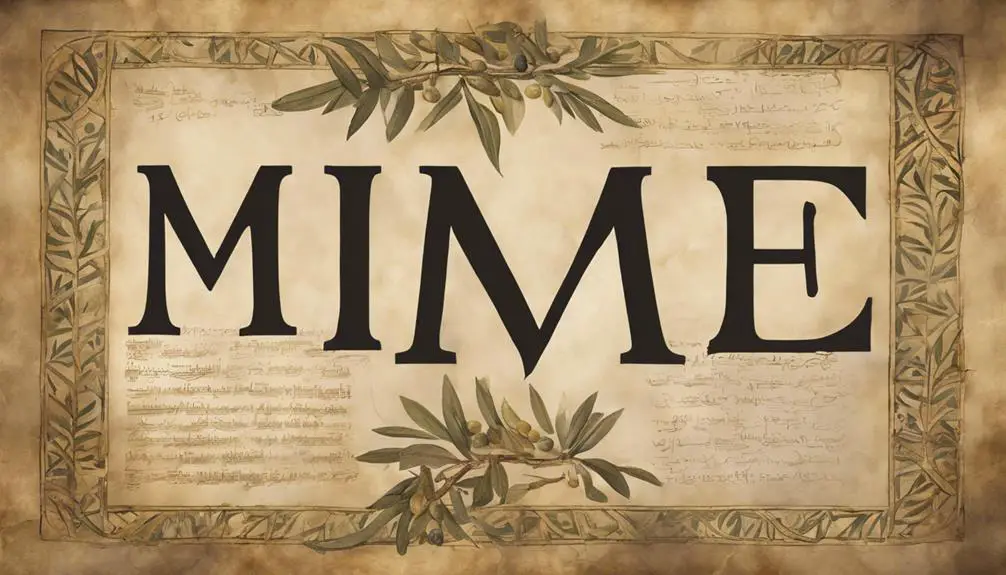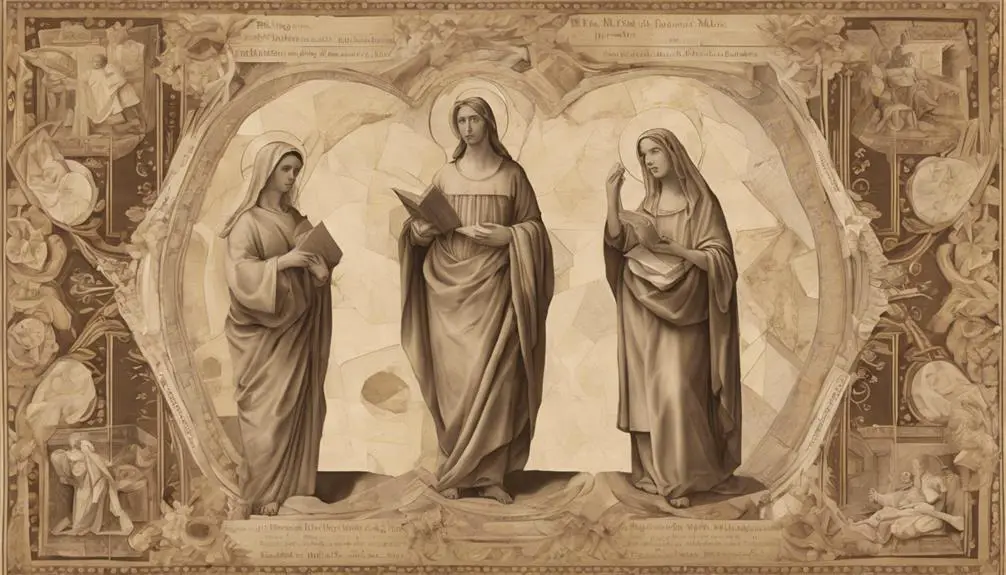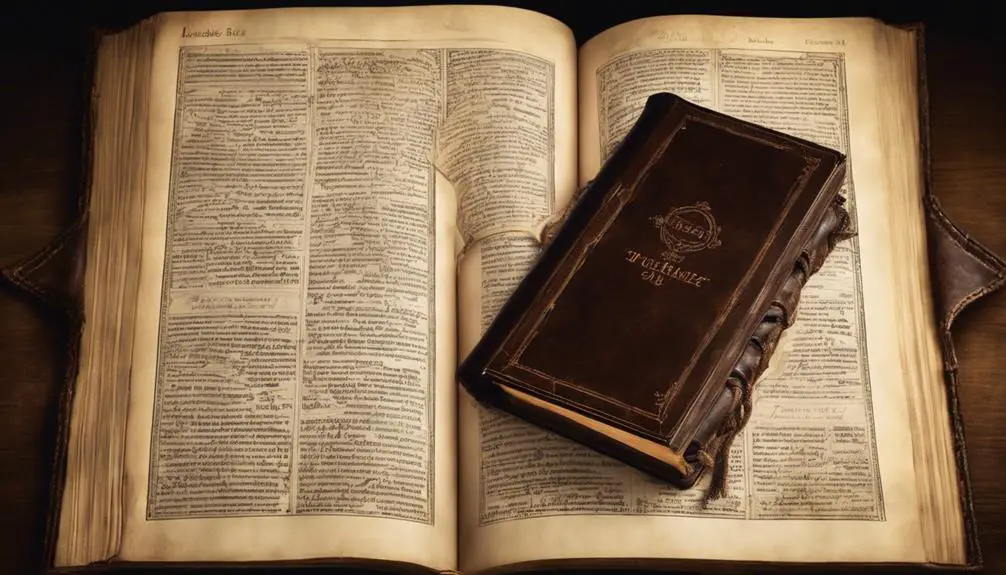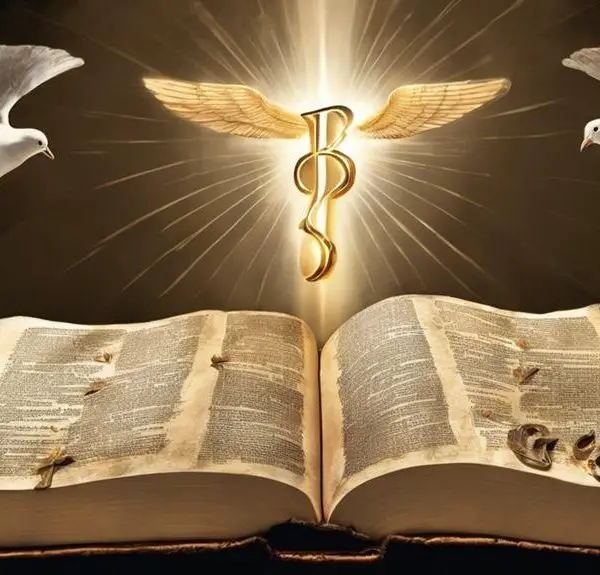Navigate the intriguing stories behind biblical names starting with 'M', unraveling their profound meanings and significant roles in sacred history.

Names in the Bible That Start With M
Ever heard of the saying 'what's in a name?' Well, when it comes to Bible names starting with 'M', there's a lot more than you might think.
From Moses to Mary, each name holds a profound meaning and has unique stories tied to it.
You'll find that these names aren't just labels, but each carries a significant role in biblical history.
Would you like to dig into this topic and uncover the intriguing tales behind these 'M' names?
Let's embark on this interesting exploration together.
Key Takeaways
- 'M' names in the Bible, like Moses and Mary, hold significant meanings pertinent to their character or destiny.
- Old Testament 'M' names like Miriam reflect narratives of faith and resilience.
- New Testament 'M' names, such as Matthew and Mark, are critical in spreading Jesus' teachings and early Christian thought.
- Understanding the etymology of 'M' names enriches comprehension of biblical narratives and provides insights into diverse cultures and faiths.
Understanding Biblical Names

To fully grasp the significance of biblical names starting with 'M', you need to understand the cultural and linguistic context they were derived from. In ancient times, names weren't just labels for identification; they carried profound meanings, often signifying the character or destiny of the bearer. This is where exploring the etymology of biblical names becomes crucial.
Take, for example, the name 'Moses.' It's derived from the Hebrew word 'Moshe', which means 'to pull out/draw out'. This directly correlates with Moses' life, as he was drawn out of the water by Pharaoh's daughter. The cultural context of biblical names, therefore, is deeply intertwined with the individual's life and story.
In Hebrew culture, changing a person's name indicated a change in their life's direction. This is evident in the transformation of Abram to Abraham and Sarai to Sarah. Such changes underscored the importance of names and their meanings.
Understanding the etymology and cultural context of biblical names gives you a richer insight into the text, bringing you closer to comprehending the biblical world's nuances. So, when you come across names starting with 'M' or any other letter, remember, they're not just names; they're narratives.
The Significance of 'M' Names

Diving into the significance of biblical names starting with 'M', you'll discover a rich tapestry of meanings, each shedding light on the individual's life journey and destiny. These names, often steeped in rich history and symbolism, offer an insightful peek into not only their personal narratives but also the broader biblical narrative.
'M' names in apocryphal books, for example, are particularly fascinating. These names, though not included in the canonical Bible, hold considerable weight. They often bear meanings connected to virtues, divine attributes, or significant events, playing key roles in their respective narratives.
The cultural impact of 'M' biblical names is just as significant. These names have permeated various cultures, shaping identities and influencing societal norms. You'll find 'M' names used widely in religious ceremonies, literature, and art, a testament to their enduring influence.
However, the true power of these 'M' names lies in their ability to encapsulate a person's character or destiny. They serve as a reminder of the individual's purpose, guiding them on their life journey. Thus, understanding the significance of these 'M' names enriches our understanding of the biblical narrative and its lasting impact on our world today.
Prominent 'M' Names in the Old Testament

When you explore the Old Testament, you'll encounter several prominent names starting with 'M' that have played pivotal roles in biblical narratives. Moses and Miriam, for instance, are two such figures whose stories and qualities offer profound insights.
Moses' leadership qualities are particularly illustrative. He demonstrates great courage and faith in God's guidance, leading the Israelites out of Egypt and through the Red Sea. His compassionate nature, humility, and perseverance are qualities that continue to inspire.
Miriam's role in Exodus is also significant. As Moses' older sister, she displays bravery and quick thinking when she ensures Moses' safety as a baby. Later, she becomes a prophetess and a leader, guiding the Israelites along with Moses and Aaron.
To summarize, consider the table below:
Name |
Role |
|---|---|
Moses |
Demonstrated leadership, courage, and faith. Led the Israelites out of Egypt. |
Miriam |
Ensured Moses' safety as a baby. Served as a prophetess and leader. |
When you delve into these 'M' names, you'll find rich narratives of faith, leadership, and resilience, which offer valuable insights into the complexities of human experience and divine interaction.
Famous 'M' Names in the New Testament

Shifting your focus to the New Testament, you'll encounter influential figures with names starting with 'M' that have significantly shaped Christian thought and tradition.
The apostolic names, in particular, reflect 'M's influence. Notably, Matthew, one of the twelve apostles, and Mark, the author of the second Gospel, were pivotal in spreading Jesus' teachings. Matthew, a former tax collector, wrote extensively about Jesus' teachings and life, providing a unique perspective on his divinity and ministry. Mark's gospel, on the other hand, is deemed as the earliest account of Jesus' life and teachings, making him an essential figure in early Christianity.
Additionally, you'll find extraordinary 'M' names in the parables. For instance, Martha, the sister of Mary and Lazarus, is remembered for her hospitality towards Jesus and her faith. However, her story serves as a reminder to prioritize spiritual over material concerns.
'M' names also extend to other significant roles. For instance, Mary Magdalene, a devoted follower of Jesus, is recognized as the 'Apostle to the Apostles' for being the first to witness the resurrection.
Meaning Behind 'M' Names

Beyond the stories and significance of these names, you'll find intriguing meanings behind the 'M' names in the Bible. As you delve deeper, you'll uncover that many of these names hold profound implications, often relating to virtues, historical events, or divine attributes.
For instance, consider 'Moses', a name of Hebrew origin that means 'drawn out of the water'. This encapsulates the dramatic circumstances of Moses' discovery as a baby. These names aren't just tags, but convey storied histories and profound meanings within a few alphabets.
However, as you explore 'M' names in other religions, you'll notice that certain meanings may differ. For instance, 'Mary', a revered name in the Bible meaning 'bitter', is also popular in Islam but holds a different connotation – 'exalted'.
One common misconception about Biblical 'M' names is that they're all of Hebrew origin. While many are, some like 'Mark' have Latin roots. Also, people often assume that these names are exclusive to the Bible, overlooking their prevalence in other religious texts. As you journey through the 'M' names in the Bible, you'll find that these names offer more than just a label – they offer insight into diverse cultures, histories, and faiths.
How 'M' Names Influence Today's World

In today's world, you're likely to encounter 'M' names from the Bible in various spheres, exerting considerable influence in areas like literature, popular culture, and personal identities.
Consider 'M' names in modern literature. They're frequently found in best-selling novels, offering symbolic and thematic depth. Names like Miriam or Moses can add a layer of biblical significance, influencing reader interpretation and understanding.
The impact of 'M' names in politics is also noteworthy. These names can be a source of charisma and credibility, enhancing a politician's relatability and appeal.
To illustrate, here's a simple table:
Sphere |
'M' Name Example |
Influence |
|---|---|---|
Literature |
'Miriam' |
Adds biblical significance |
Politics |
'Moses' |
Enhances charisma and appeal |
Popular Culture |
'Michael' |
Boosts recognizability |
Personal Identities |
'Mary' |
Strengthens religious connection |
These names are more than just identifiers; they carry connotations that can subtly shape perceptions. So next time you encounter an 'M' name from the Bible, remember its potential impact. It's not just a name; it's a tool that influences today's world in ways you might not have considered.
Frequently Asked Questions
Are There Any 'M' Names From the Bible That Are Common Amongst Both Men and Women?
You're asking about 'M' names from the Bible that are gender-neutral. While most biblical names are gender-specific, there's ambiguity in Apocryphal texts.
For example, 'Mara' can be used for both sexes. Remember though, it's rare to find truly gender-neutral biblical M names.
Most have evolved in usage over time, taking on a more unisex character in modern society than they originally had in biblical times.
What Are Some Lesser-Known 'M' Names in the Bible That Are Not Mentioned in the Old or New Testament?
You're seeking lesser-known 'M' names not found in the Old or New Testament. Instead, these names may be found in lost biblical texts. 'M' names like 'Marah' or 'Magog' carry certain symbolism from biblical times.
'Marah,' for instance, signifies 'bitterness'. 'Magog' is associated with end times. Such names aren't as widely recognized, but they're part of a rich biblical tradition.
Are There Any 'M' Names in the Bible That Have Evolved or Changed in Spelling Over Time?
Yes, 'M' names in the Bible have evolved over time. For instance, names in apocryphal books like 'Maccabeus' have transformed into 'Maccabee.' Similarly, 'Mariamne' has become 'Mary.'
The influence of 'M' biblical names in modern culture is evident, as they've been adapted to fit contemporary language trends. This evolution in spelling helps keep these names relevant and relatable, while still maintaining their historical and religious significance.
How Many 'M' Names in the Bible Have Been Used as Names for Places or Landmarks?
You're exploring how many 'M' names from the Bible have influenced our geographical map. Let's dig into the importance of these 'M' names in Biblical geography.
It's fascinating to see the impact of these Biblical names on modern city names. Many places owe their names to Biblical figures, underscoring the pervasive influence of these 'M' names.
While it's tough to give an exact count, the influence is undeniable and widespread across continents.
Are There Any Significant Biblical Figures That Changed Their Name to an 'M' Name?
Yes, you'll find several significant figures in the Bible who've changed their name to an 'M' name. For instance, Abram became Abraham, with 'M' ending.
These 'M' name translations often carry profound interpretations and meanings.
The impact of these 'M' names and the biblical characters behind them have had an undeniable influence on society, shaping cultural, religious, and moral norms over centuries.
Conclusion
In conclusion, 'M' names in the Bible have a profound significance, with both Old and New Testaments featuring influential figures bearing 'M' names. These names not only carry deep meanings but also continue to shape the modern world.
By understanding the roots and meanings behind these names, you can gain a more profound understanding of biblical stories and their relevance today. So, don't underestimate the power of a name, especially when it starts with 'M'.



Sign up